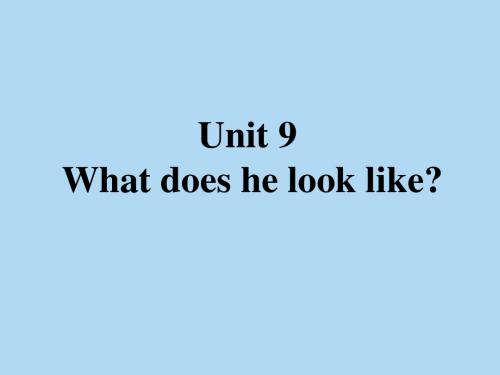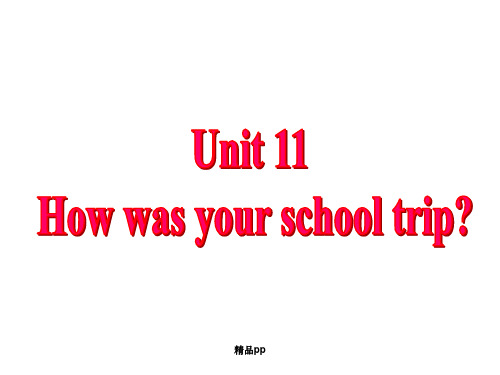山东省郓城县随官屯镇初级中学七年级英语下册课件:Unit 11 (共20张PPT)
人教版七年级下-unit11-Section-B-2a-2c-(共20张PPT)

Leave a blank if they can mean both.
__√_
___
interesting ___ difficult __√_ lovely slow _√__ exciting ___ boring _√__
exciting trip for me and I was so excited. First, I had to fly to Shengzheng. The plane tickets were really expensive. Later, I had great fun in
What is the passage about?
not good.
• cheap
➢ "Cheap”can be good. It's not expensive. ➢ "Cheap" can be bad. It has probably bad
quality.
2a Do the following words describe good things or
1. Read the passage again and imitate the pronunciation
and intonation.(☆) Necessary
2. Classify the descriptive words and make five
sentences. (☆☆) Optional
It is about their trips.
Helen
Jim
Check your predictions by reading the first and last sentences. Tip: The first or the last sentence
山东省郓城县随官屯镇七年级英语下册 Unit 11 How was your school trip

Unit 11 How was your school tripA第4课时 2b-Self Check教学目标一、知识与技能1. Improve the comprehensive reading ability.2. Master some important language points.3.复习并学习形容词,能区分褒义词和贬义词。
4.能够通过阅读短文使学生学会如何使用形容词进行评论,怎样发表自己感想。
5.学会使用一般过去时态写日记。
6. Master the words and structures.二、过程与方法Read, think, make notes.Teaching mixed with explanation.三、情感态度与价值观培养阅读思考、总结的习惯教学重点1. Improve the comprehensive reading ability.2. Master some important language points.3.复习并学习形容词,能区分褒义词和贬义词。
4.能够通过阅读短文使学生学会如何使用形容词进行评论,怎样发表自己感想。
5.学会使用一般过去时态写日记。
6. Master thewords and structures.教学难点能够通过阅读短文使学生学会如何使用形容词进行评论,怎样发表自己感想。
学会使用一般过去时态写日记。
教法导航指导学生自主探究,合作研习学法导航善于做笔记,勤动脑,自己造句子,加强记忆。
教师准备PPT,朗读记忆新词汇教学过程Step 1 GreetingsHow ar e you feeling today?What did you do last ni ght?How was your homework yesterday?Step 2 Reading 2b,2c1. Read Helen’s and Jim’s diary entries and answer the questions in 2b.2. Go through the chart in 2c and read the diaries again .Complete the chartin 2c.How do Helen and Jim describe these things ?3. Check the answers .Ask Ss to pay attention to the past tense verbs.4. Explain the language points.Go on a school trip, along the way, play chess with sb.all in all, take the train to sp. ,boring,be interested in sth. , not at all.5. Read the passa ges aloud.Step 3 3a1. Let th estudents look at the pictures of Bob’s school trip.Imagine how wasBob’s trip. Go through the diary and try to fill in the blanks.Check the answers.Read the diary aloud.2. Using the same w ay to learn the Linda’s diary.Step 4 3cGive the students enough time to write a diary entry for their own school trip.Let one or two students report their article.T make some comments on their article.Step 5 Self Check1. Write more verbs and their past forms in each group.(并让学生总结动词过去式的变化规律)开展比赛,看谁记住的单词多2. Complete the convers ations with the correct forms of the verbs in the box.3. Check the answers.4. Read aloud.Step 6 HomeworkSum up what they have learned in this unit.板书展示Unit 11 How was your school trip?课堂作业快乐阅读In England, people don’t talk to each other when they travel. If you get ona bus, or in a train, you will sometimes see people sitting and looking out of thewindow. Other people will be reading books or newspapers.When you meet English people, they often begin a conversation by talking about the weather. So when you meet somebody in England, you can say, “Nice weather for the time of the year!”“But it was a little cold yesterday,” somebody may answer.“But it will get a little warmer later,” you can say.Talk like this, and the English will think, “How friendly you are!”( ) 1. English people often ___________ on the bus.A. talk a lotB. talk to each otherC. read newspapers( ) 2. When you meet an English people, you can begin the conversation by talking about the __________.A. weathe rB. timeC. food( ) 3.According to the passage, if you talk to English people about the w eather, they will think you are ___________.A. English.B. rightC. friendly( ) 4. Which sentence is true?A. English people like traveling by bus.B. English people are unfriendly.C. English people don’t talk much when they’re by train.参考答案:C A C C教学反思本节课不仅提高了学生的阅读能力,还对整个单元的重点句型和动词的过去式的变化进行了总结,整节课都是在积极地思考中度过,因此目标得以巩固和落实。
山东省郓城县随官屯镇初级中学七年级英语下册课件:Unit9共20张PPT1

asks Student A questions about one of the people and then draws a picture of the person.
2d Role-play the conversation.
Mike: Hi, Tony. Are you going to the movie tonight? Tony: Yes. We’re meeting at seven, right? Mike: Yeah, but I may be a little late. My friend David is going, too. Just meet him in front of the cinema first. Tony: Oh, but I don’t know him. What does he look like? Mike: Well, he has brown hair and wears glasses. Tony: OK. Is he tall or short? Mike: He isn’t tall or short. He’s of medium height. Tony: OK, sure. See you later then.
Unit 9 What does he look like?
Section A 1a Match the words with the people in the picture.
You can use some letters more than once.
1. short hair e 2. curly hair b a 3. long hair 4. straight hair f/a 5. tall h 6. short f 7. medium height g 8. thin c 9. heavy d 10. medium build a/e/g
七年级英语下学期unit11课件.ppt

run eat breakfast take a shower go to school
B: I usually get up at five o’clock.
run at
eat breakfast at
take a shower at
go to school at
2a, Page sixty-six
Do you go to school every day? What time do you go to school? What time do you go to bed? What time does your father go to work?
What time do you get up every morning? What time does your mother get up in
class !
What a difficult time to run in the
morning !
after breakfast / lunch / dinner / the class / 7:35 am
before breakfast / lunch / dinner / the class / 7:35 am
What time is it ? It’s 6: 01.
What time is it ? It’s 4: 08.
What time is it ? It’s 10: 10.
What time is it ?
It’s 2: 30.
30: thirty
What time is it ? It’s 1: 50.
Saturday.
listen to sb. watch the early morning news on TV watch football games on TV watch TV
七年级下册英语第11单元课件ppt课件

精品pp
A: What _d_id_ you do yesterday?
B: I _w_e_n_t_ to the movie.
A: What _d_id_ you do last weekend?
B: I d__id_ my homework.
精品pp
What did you _d_o_ last weekend? We _v_is_i_te_d__th__e_f_ir_e_s_t_a_t_io_n_._ How w__a_s your trip last weekend? It was boring.
last month.
2. My mother _d_i_d_n_’_t_d_o (not do) housework
yesterday.
3. __D__id____ your father ___g_o____ (go) to
work every day last year?
4. He __w__a_s___ (be) here just now.
规则动词过去式的构成
构成规则
原形
一般在动词原形末尾加-ed work play
结尾是e的动词加-d
hope live
末尾只有一个辅音字母的 重读闭音节词,先双写这
stop
个辅音字母,再加-ed
trip
结尾是“辅音字母+y”的动 词,先变“y”为“ i”再精品加pp-
study worry
过去式 worked played hoped
精品pp
picked visited watched climbed studied worried played lived stopped
七下英语第11单元课件

七下英语第11单元课件七下英语第11单元课件7年级英语下册第11单元知识点课件1. How was your school trip?How + be + 主语?= What be +主语 + like?意为“怎么样?”本句的答语:It was great./ It was OK./ It was /wasn’t good.2. quiet a lot (相当多)+of+可数名词(复数)/不可数名词,也可单独使用。
e.g. We drank quite a lot of milk.I saw quite a lot of cows.I play tennis quite a lot in the summer.拓展:1) quite a little +不可数名词,意为“相当多”;e.g. There is quite a little water in the bottle.2) quite a few 相当多+可数名词,意为“相当多”。
e.g. Quite a few students were late.3. take与photo, picture等词搭配时,意为“拍摄,摄影”。
表示“拍摄某物或人”,就要在短语后面接介词of来引入所拍摄的对象。
e.g. The girl likes to take photos of herself with her cell phone(手机).那个女孩喜欢用自己的手机自拍。
4. ...learned a lot about farming. 学到了很多关于种田的知识。
1) learn sth. 学习某物I learn English every day.2) learn about 学习关于某事,如:He wants to learn more about science.3) learn to do sth. 学习做某事,如:We all want to learn to swim.5. It was so much fun. 那真是蛮好玩的。
七年级英语下学期unit11课件
What time is it ? It’s 6: 01.
What time is it ? It’s 4: 08.
What time is it ? It’s 10: 10.
What time is it ?
It’s 2: 30.
30: thirty
What time is it ? It’s 1: 50.
Are you busy now ? Are you always busy ? Are you busy in the morning ? Are you busy in the afternoon ? Are you busy in the evening?
Why are you busy in the morning ? Because we do morning exercise .
Why are you busy in the afternoon ? Why are you busy in the evening? Because we need to do our homework.
Can you make ice cream? Can you make a guitar? Can you make a violin? Can you make a drum? Can you make a schedule?
How many brothers does Rick have? He has 2 brothers. How many showers does Rick’s family
have? It has only one.
2b, Page sixtysix
Finish the shower schedule.
初一英语下学期unit11PPT课件
2020年10月2日
1
2020年10月2日
2
What are these TV shows?
2020年10月2日
host
3
2020年10月2日
4
2020年10月2日
5
2020年10月2日
6
2020年10月2日
soap operas
汇报人:XXX 汇报日期:20XX年10月10日
23
shows shows
operas
shows
I
Mary
Give a report like this: I love game shows,
because I think they are so relaxing ,but my friend
Mary likes talk shows, because she thinks they are
7
news
2020年10月2日
8
Look nd match
1.__C____ 2.2_02_0B年_1_0月_2日
3.__A____
6.__E____
A: Talk show
B: Sports show
4.___D___
C: Game show D: Sitcom
E: Soap opera
5.__F____ F: News 9
brother, Xiao Bao. How about you?
20A20:年1I0月d2o日n’t like him. In fact, I _d_o__n_’t__like sitcoms. 18
sports shows
推荐K12山东省郓城县随官屯镇七年级英语下册Unit11Howwasyourschooltrip教案新版人教新目标版
K12教育资料(小初高学习)Unit 11 How was your school trip?教材解读本单元以“学校旅行”为主题,以同学之间谈论各自的游览经历为背景,展开多种形式的语言训练活动,在各个活动中学生逐步学会运用一般过去式叙述和询问过去的活动经历,并灵活运用be动词和实义动词以及不规则动词的变化。
总之,通过本单元的学习要使学生对过去式有一个深入的了解。
单元目标一、知识与技能.1. Can talk about the past events.2. 能正确使用be动词和实义动词的一般过去时描述和询问过去的状态。
3. 能归纳规则动词过去式的变化规律并写出部分规则动词和不规则动词的过去式。
4. Master some important words and useful expressions.二、过程与方法采用任务型语言教学,实施情景教学法、交际法、情感激励法等教学方法。
三、情感态度与价值观培养学生的合作精神。
教法导航采用直观教学法,遵循以学生为主体,充分调动学生的积极性的原则。
学法导航培养学生的交际能力和认知能力。
课时支配第1课时:Section A1a-2c第2课时:Section A2d-3b第3课时:Section B 1a-2a第4课时:Section B 2b-Self Check课时教案K12教育资料(小初高学习) 1第1课时 1a-2c教学目标一、知识与技能1. 学会用动词的过去式描述过去发生的事。
2. Improve the listening and speaking skill.3. 掌握一些规则变化动词的过去式和一些不规则变化的动词。
二、过程与方法采用目标和任务教学法,调动学生的积极性,引导他们积极参与课堂。
三、情感态度与价值观提高认知能力。
教学重点1. 学会用动词的过去式描述过去发生的事。
2. Improve the listening and speaking skill.3. 掌握一些规则变化动词的过去式和一些不规则变化的动词教学难点学会用动词的过去式描述过去发生的事。
七年级英语下册unit11sectionA2a2d.ppt
陈述句:主语+动词过去式+其它 I go to the movie. →I went to the movie. 否定句:主语+助动词didn’t+动词原形+其它 I don’t go to school today. →I didn’t go to school. 一般疑问句:Did +主语+动词原形+其它? Do you have breakfast? →Did you have breakfast? Yes, I do./No, I don’t. Yes, I did./No, I didn’t.
take pictures of + 某人/某物
表示“拍摄某物或人”,例如: I took photos of Chen Zhifeng 我拍了陈志锋照片。
3. And I fed the chickens with my grandpa. 我和我的爷爷喂鸡。
fed (the) chickens 喂鸡 例如:
[əʊt]n.燕麦 He fed oats to his horse. 他给他的马喂养燕麦。
4. It was so much fun. 那真是蛮好玩的。
fun 表示“有趣的事情”,为不可数名词。 例如:
5. Lucky you! 你真幸运! 这是一句非正式口语,= You’re so lucky. lucky 之后的人称还可改为me, him 等。
And I fed the chickens with my grandpa. It was so much fun.
Peter: Sounds good. How was the weather there?
Eric: It was great, and the air was so clean. I watched the stars at night. They were so beautiful.
- 1、下载文档前请自行甄别文档内容的完整性,平台不提供额外的编辑、内容补充、找答案等附加服务。
- 2、"仅部分预览"的文档,不可在线预览部分如存在完整性等问题,可反馈申请退款(可完整预览的文档不适用该条件!)。
- 3、如文档侵犯您的权益,请联系客服反馈,我们会尽快为您处理(人工客服工作时间:9:00-18:30)。
Section A
1a Match the phrases with the pictures.
1. went for a walk e 2. milked a cow b 3. rode a horse a 4. fed chickens c 5. talked with a farmer f 6. took some photos d
1b Listen and circle the three things Carol did on
her school trip in 1a. 1. went for a walk 2. milked a cow 3. rode a horse 4. fed chickens 5. talked with a farmer 6. took some photos
3a Complete Jim’s letter on the left and Bill’s reply
on the right.
was
go Did Did Did see went was
had went climbed saw ate
played
was
got worried
did not
came
1c Ask and answer questions about Carol’s school
trip. A: Did Carol take any photos? B: Yes, she did.
2a Listen and check (✔) the questions you hear.
✔ ✔
bad things? Put a ✔ for good and an ✘ for bad. Leave a blank if they can mean both.
interesting exciting lucky delicious difficult boring large great lovely cool expensive cheap slow hot terrible fast
2b Read Helen’s and Jim’s diary entries and answer
the questions. 1. Did Helen and Jim go on the same trip? 2. How do they feel about the trip?
good-bye!
1b Listen and answer the questions.
1. How was Jane’s trip?
It was terrible.
2. How was Tony’s trip?
It was great.
1c Listen again. What did Jane and Tony do on
their last school trip? Check (✔) Tony or Jane.
✔ ✔ ✔
✔
✔
1d What was your last school trip like? Discuss it
with your partner.
2a Do the following words describe good things or
3b Make up a story. Each student adds a sentence.
Section B 1a Match the activities with the pictures.
1. go to the zoo a 2. visit a museum c 3. ride a horse b 4. climb a mountain e 5. visit a fire station d 6. go fishing f
2d Role-play the conversation.
Peter: Hi, Eric. How was your trip last week? Eric: It was excellent. I visited my grandparents in the countryside. Peter: Oh, nice. What did you do? Eric: I went fishing every day. And I fed the chickens with my grandpa. It was so much fun. Peter: Sounds good. How was the weather there? Eric: It was great, and the air was so clean. I watched the stars at night. They were so beautiful. Peter: Lucky you.
✔✔Βιβλιοθήκη 2b Listen again. Circle T for true or F for false.
2c Ask and answer questions about Carol’s visit to
the farm. A: What did Carol do? B: She picked some strawberries.
